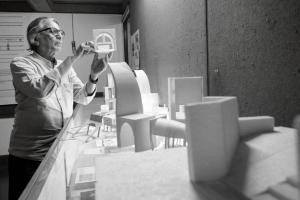...as shown to us by Pritzker Prize-winning architect, Balkrishna Doshi, who has just created a magazine cover in concrete

Pritzker Prize-winning architect Balkrishna Doshi
It's likely that most of us have missed the chance to own one of Balkrishna Doshi's designs. That's an opportunity that would have been anyway hard to come by, given that most of this Ahmedabad-based architect's projects were educational institutions, public structures and low-cost housing. There is also Amdavad ni Gufa, an enigmatic cave-like art gallery, the walls of which were turned into a canvas by MF Husain.
ADVERTISEMENT
However, here is a rare chance to make this visionary's aesthetic your own. The July-August edition of Architecture Digest India (AD) has, quite possibly, the world's first concrete-finish magazine cover designed by Doshi. As an influential architect of post-Independence India, Doshi, 90, was awarded the Pritzker Architecture Prize (the Nobel equivalent for the field) earlier this year, becoming the first Indian to receive the award. The Pritzker jury statement read, in words that have now become synonymous with Doshi: "[He] has always created an architecture that is serious, never flashy or a follower of trends." In an interview, Doshi share his thoughts on contemporary Indian architecture.
Edited excerpts:
In the recent years, architects and urbanists have been concerned about the lack of iconicity in contemporary projects. Do you hold a similar opinion?
I think that identity is very important, and what you believe in, where you live, your fundamental values are very important. It is very important to ask ourselves: What is the real essence?

The view from Sangath, Doshi's studio. Pics/Vastushilpa Consultants
Do you think there is a scope in the country today to implement such designs as the ones you did for low-cost housing?
Integration. Integrating life and your daily habits. The role of an architect is to find a way by which everybody gets a home, a place to not only live in but one where you have your own community. I have done my housing projects with an idea that you will feel, over time, over generations, a sense of cohesive society. There you will feel: This is mine, this is what I like, this is the way I live.
You have earlier spoken about how skyscrapers do not interest you. However, going vertical seems to be the only option in a city like Mumbai. What are your thoughts on this?
We had done many studies on this. We found that you don't have to make only high-rises; you can also create buildings with densities which we call 'higher density low rise'. Second, we should know how to really make a proper urban design, city plan, structure plan. That is what we tried to propose in Kharghar [planned by Doshi when he was a consultant with CIDCO]. I have not seen it after it has been completed but I think there are lessons there.
Several infrastructure projects in the country don't take into consideration their local environments. It is very much the case with Mumbai's coastal road, the metro, and residential or business projects.
I think it goes without saying that it is the responsibility of the architects and also other people to consider the larger plan. Where is the urban plan? Where is the future? I think we always go by repairing a flat tyre. Every time something happens, we try to repair and that is not how cities are made. I think this is where our problem is. We go piecemeal; we have no vision and we have no idea how long term visions are made.
As an apprentice of Le Corbusier, what were your greatest learnings that you think are most relevant even today?
The first thing is connecting with the place — its philosophy, its behavioural patterns and its connection to the cosmic forces. I think this is the Indian way of creating architecture. Le Corbusier studied all these aspects of India and designed the buildings here, turning every project into a magnet of opportunity and discovery for the people of India.
Catch up on all the latest Mumbai news, crime news, current affairs, and also a complete guide on Mumbai from food to things to do and events across the city here. Also download the new mid-day Android and iOS apps to get latest updates
 Subscribe today by clicking the link and stay updated with the latest news!" Click here!
Subscribe today by clicking the link and stay updated with the latest news!" Click here!






